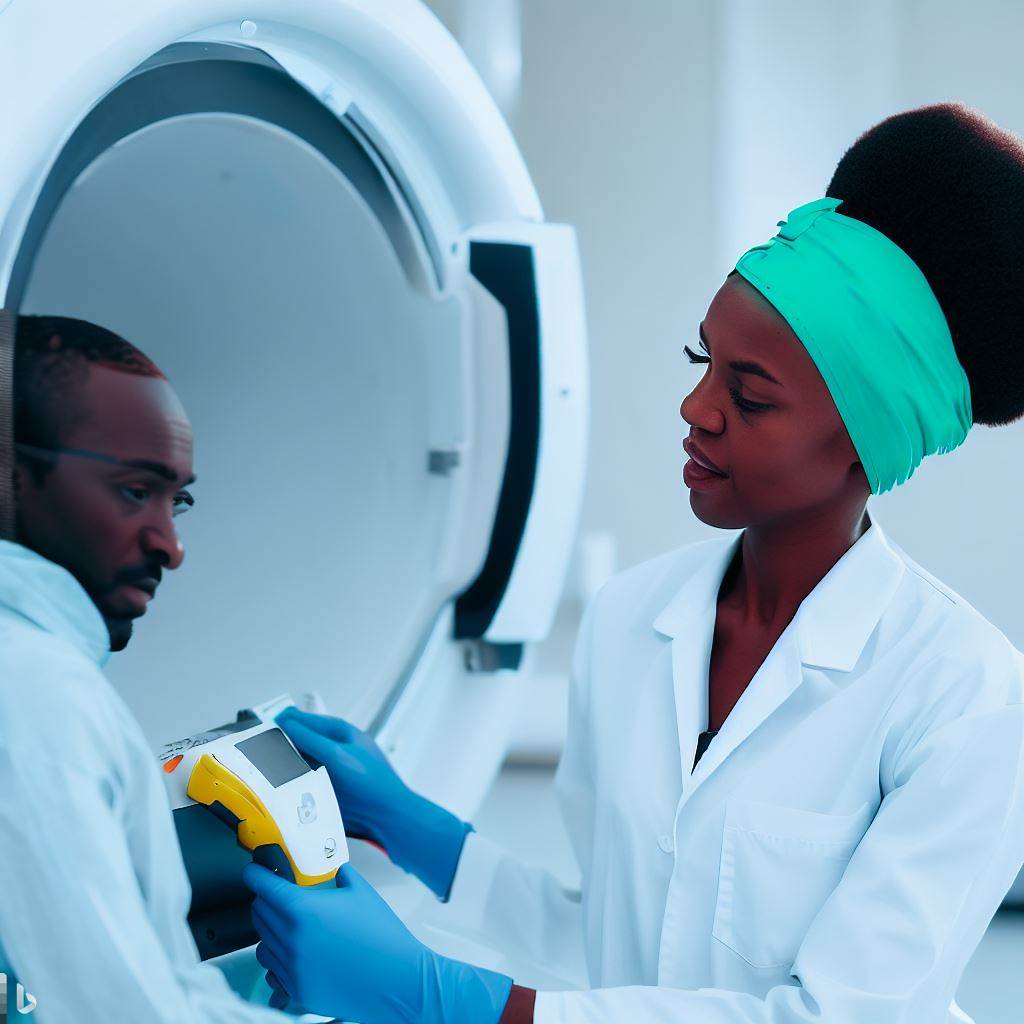Introduction
MRI technology is a remarkable medical imaging technique that uses powerful magnets and radio waves to create detailed images of the inside of the body. Understanding this technology is essential for both medical professionals and the general public.
MRI technology has revolutionized the field of medicine by providing non-invasive and highly accurate images of the body’s internal structures.
With MRI scans, doctors can diagnose and monitor various medical conditions, including tumors, infections, and neurological disorders.
For the layman, understanding MRI technology is crucial for making informed decisions about medical procedures and treatments. It allows individuals to actively participate in their healthcare journey and ask relevant questions to their healthcare providers.
The purpose of this blog post is to demystify MRI technology in Nigeria, making it accessible and comprehensible to the general public. By breaking down complex concepts into simple terms, we aim to empower readers with the knowledge necessary to navigate MRI procedures and results.
Throughout this blog, we will explore the fundamentals of MRI technology, its benefits, and its importance in healthcare. We will also address common misconceptions and provide practical tips for preparing for an MRI scan.
By the end of this blog post, readers will have a clear understanding of MRI technology and its significance, enabling them to make informed decisions about their health and well-being in Nigeria.
Basics of MRI Technology
MRI stands for Magnetic Resonance Imaging, a medical imaging technique that uses strong magnets and radio waves.
It works by creating a magnetic field that aligns hydrogen atoms in the body, then sending radio waves to disrupt this alignment.
When the radio waves are turned off, the hydrogen atoms realign and release energy, which is detected and translated into images.
This process provides detailed pictures of the body’s internal structures and can help diagnose a wide range of health conditions.
Components of an MRI machine
An MRI machine consists of a cylindrical tube or bore, where the patient lies during the imaging process.
Inside the tube, there is a powerful magnet that creates the necessary magnetic field to generate images.
There are also coils that emit radio waves and receive the energy emitted by hydrogen atoms.
A computer system processes this information and generates detailed images of the body.
Different types of MRI scans
There are different types of MRI scans, depending on the body part being examined or the specific information required.
Common types include brain MRI, spine MRI, joint MRI, and abdominal MRI, among others.
Each type of scan may require special positions or techniques to obtain the most accurate and informative images.
Comparison with other medical imaging techniques
Compared to other medical imaging techniques like X-rays and CT scans, MRI provides more detailed and precise images.
MRI does not use ionizing radiation, making it safer and preferred for certain groups, such as pregnant women and children.
While X-rays and CT scans are better suited for detecting bone injuries, MRI is excellent for soft tissue visualization.
MRI can reveal abnormalities in organs, muscles, ligaments, and nerves, aiding in the diagnosis of various diseases.
Basically, MRI technology is a powerful medical imaging technique that utilizes magnetic fields and radio waves to generate detailed images of the body.
With its various components, an MRI machine creates a safe and non-invasive environment for patients. Different types of scans allow for specific examination of different body regions.
Additionally, the comparison with other imaging techniques highlights the advantages and strengths of MRI in providing accurate diagnoses and detailed soft tissue visualization.
Understanding the basics of MRI technology is essential for demystifying its workings and appreciating its significance in modern healthcare.
Read: Day in the Life: What It’s Like Being an Optometrist in Nigeria
Benefits of MRI Scans
Non-invasiveness
MRI scans are non-invasive, meaning they do not require any incisions or injections.
This makes them a preferable choice for many patients as they can avoid the discomfort and risks associated with invasive procedures.
No exposure to radiation
Unlike other imaging techniques like X-rays and CT scans, MRI scans do not use ionizing radiation.
This eliminates the potential harm and long-term effects of radiation exposure, making MRI a safer option.
Detailed images for accurate diagnoses
MRI scans provide highly detailed and comprehensive images of the internal structures of the body.
This enables healthcare professionals to accurately diagnose and evaluate a wide range of conditions.
By visualizing organs, tissues, and abnormalities, MRI scans help identify the root cause of symptoms.
Ability to detect a wide range of conditions
MRI scans are capable of detecting various conditions affecting different parts of the body.
They can help identify tumors, infections, inflammation, degeneration, and abnormalities in the brain, spine, joints, and organs.
This makes MRI scans a versatile and valuable tool in healthcare.
Essentially, MRI scans offer numerous benefits in medical diagnostics and provide valuable insights into the human body.
Their non-invasive nature, absence of radiation exposure, ability to provide detailed images, and wide range of conditions they can detect contribute to their popularity.
By understanding the advantages of MRI technology, individuals can make informed decisions regarding their health and treatment options.
Read: Nigeria’s Health Sector: Role of Phlebotomists Explained
Preparing for an MRI Scan
Explanation of the process
An MRI scan is a painless procedure that uses a magnetic field and radio waves to create detailed images of the body.
Before the scan, the patient will be asked to change into a hospital gown and remove any metal objects.
The patient will lie down on a moving table that slides into a tunnel-like machine for the duration of the scan.
During the scan, it is important for the patient to remain still so that clear images can be obtained.
The technician will communicate with the patient through an intercom system and the scan may take anywhere from 30 minutes to an hour.
There is no pain or discomfort associated with the MRI scan, but some patients may find the noise generated by the machine to be loud.
After the scan is complete, the images will be reviewed by a radiologist who will provide a report to the patient’s doctor.
Dietary and medication considerations
It is important to inform the doctor or technician if the patient has any allergies or sensitivities to medications or contrast dye.
In some cases, the doctor may ask the patient to fast for a few hours before the scan, especially if contrast dye will be used.
Patients should also inform the doctor about any medications they are currently taking, as some may interfere with the MRI scan.
Read: Top Institutions to Study Phlebotomy in Nigeria
Removing metal objects and jewelry
Before the MRI scan, the patient will need to remove all metal objects, including jewelry, watches, and hairpins.
Metal objects can interfere with the magnetic field and cause artifacts in the images, making them less clear.
If the patient has any metal implants, such as pacemakers or joint replacements, they should inform the doctor before the scan.
Managing anxiety and claustrophobia
Some patients may experience anxiety or claustrophobia during an MRI scan due to the confined space of the machine.
It is important to communicate any concerns or fears to the doctor or technician before the scan.
They may be able to provide a sedative or offer other techniques to help the patient relax during the scan.
Listening to music or using earplugs during the scan can also help reduce anxiety caused by the noise of the machine.
Preparing for an MRI scan may involve explaining the process, considering dietary and medication factors, removing metal objects, and managing anxiety and claustrophobia.
Following these steps can ensure a successful and comfortable scan.
Read: Common Challenges Faced by Optometrists in Nigeria

What to Expect During an MRI Scan
Description of the scanning room and equipment
- The scanning room is typically well-lit, spacious, and has a large MRI machine.
- The machine consists of a tunnel-like structure with a table that slides in and out.
- It is equipped with advanced technology to generate detailed images of the body.
Positioning on the MRI table
- You will be asked to lie down on the MRI table, which will then slide into the machine.
- The radiologist or technologist will assist you in finding a comfortable position.
- You may be given cushions or straps to help you stay still during the scan.
Duration of the scan
- The duration of an MRI scan can vary depending on the area being examined.
- It usually lasts between 30 minutes to an hour, but some scans may take longer.
- It is important to inquire about the estimated duration before the scan to plan accordingly.
Importance of remaining still
It is crucial to remain still during the MRI scan to avoid blurring of the images.
Even slight movements can affect the quality of the images and may require retakes.
The radiologist or technologist will communicate with you throughout the scan to ensure your comfort.
Ultimately, undergoing an MRI scan involves entering a spacious scanning room with a specialized machine.
You would need to position yourself carefully on the MRI table and remain motionless throughout the scan.
The duration of the scan may vary, and it is vital to stay still to obtain clear and accurate images for diagnosis.
Read: Interview Tips for Aspiring Phlebotomists in Nigeria
Common Misconceptions about MRI Technology
In this blog, we will address some common misconceptions about MRI technology in Nigeria.
Exposure to harmful radiation
Contrary to popular belief, MRI does not expose patients to harmful radiation.
MRI scans use magnetic fields and radio waves to create detailed images of the body.
This imaging technique is considered safe and does not involve any ionizing radiation.
Unlike X-rays or CT scans, MRI poses no risk of causing damage to DNA or cells.
Potential dangers of MRI scans
There are minimal potential dangers associated with undergoing an MRI scan.
Most modern MRI machines are designed with safety features to minimize risks.
However, certain individuals may face risks if they have metallic implants or devices.
Prior to the scan, patients are thoroughly screened for any potential safety concerns.
Magnetic interference with implants or devices
MRI machines do generate strong magnetic fields, which can interfere with certain implants or devices.
Before undergoing an MRI, it is crucial to inform the healthcare provider about any existing implants.
Examples of implants that may be affected include pacemakers, cochlear implants, or metal clips.
Healthcare professionals will assess the compatibility and safety of the MRI for each individual case.
Magnetic attraction of metallic objects
The magnetic field of an MRI machine can cause metallic objects to move or become dislodged.
This can be a concern if patients bring in items such as jewelry, keys, or loose metal objects.
Prior to entering the MRI room, patients are advised to remove all metallic objects.
The healthcare staff will ensure patient safety by enforcing strict protocols to avoid accidents.
Overall, it is important to dispel common misconceptions about MRI technology in Nigeria.
Publish Your Professional Profile, Business or Brand
Showcase your expertise, gain trust, and boost visibility instantly on Professions.ng.
Publish NowMRI scans do not expose individuals to harmful radiation, and the potential risks are minimal.
Healthcare providers take necessary precautions to ensure patient safety and prevent incidents.
By understanding the facts, Nigerians can confidently utilize MRI technology for accurate diagnoses.
Read: The Path to Becoming a Surgeon in Nigeria
Availability and Affordability of MRI Technology in Nigeria
Overview of the current state of MRI technology in Nigeria
MRI technology has seen significant growth in Nigeria in recent years.
Several private and public hospitals now offer MRI scans to the general population.
However, the availability is still limited compared to the demand.
Major cities like Lagos, Abuja, and Port Harcourt have better access to MRI technology.
Rural areas, on the other hand, have very limited or no access to MRI scans.
Challenges faced in accessing MRI scans
- The high cost of purchasing and maintaining MRI machines poses a major challenge.
- Limited infrastructure and trained professionals contribute to the shortage in many areas.
- Electricity instability and poor maintenance affect the functionality of MRI machines.
- Lack of awareness among the population about the benefits of MRI technology.
- Long waiting times due to the limited number of available MRI machines in the country.
Cost considerations and potential solutions
The cost of MRI scans in Nigeria is relatively high, making it unaffordable for many.
Potential solutions include government subsidies to reduce the cost for patients.
Encouraging private-public partnerships to establish more MRI centers can increase competition and lower costs.
Negotiating with manufacturers for reduced prices or lease options can make MRI machines more affordable.
Introducing health insurance coverage for MRI scans can help individuals afford the cost.
Importance of increasing accessibility across the country
- Increasing accessibility to MRI technology is crucial for a better healthcare system.
- Early detection and accurate diagnosis provided by MRI scans can save lives.
- Timely access to MRI scans can improve treatment outcomes and reduce healthcare costs in the long run.
- Making MRI scans more accessible can help attract and retain skilled professionals in the country.
- Improved accessibility can lead to better research and advancements in medical practices in Nigeria.
In short, while MRI technology in Nigeria has shown progress, there are still significant challenges in terms of availability and affordability.
Limited access, high costs, and infrastructure issues hinder widespread utilization of MRI scans. The government, healthcare providers, and manufacturers need to work together to overcome these challenges and make MRI technology more accessible and affordable for all Nigerians.
Doing so will have a positive impact on healthcare outcomes and contribute to the overall development of the country’s medical sector.
Conclusion
In this blog, we have demystified the MRI technology in Nigeria. We have learned about its uses in diagnosing various medical conditions and the benefits it offers in terms of non-invasive and accurate imaging.
MRI scans have proven to be effective in detecting abnormalities in the body, including tumors, injuries, and diseases. By providing detailed images of the organs and tissues, they aid medical professionals in making informed decisions regarding treatment and further investigations.
Additionally, we explored the process of undergoing an MRI scan, debunking common misconceptions and addressing concerns such as claustrophobia and safety. It is essential to highlight that MRI scans are generally safe and cause no harmful radiation.
If you found this blog intriguing and would like to delve deeper into the world of MRI technology, we encourage you to seek further information. Consider consulting trusted healthcare professionals, conducting online research, or even reaching out to MRI centers directly for accurate and personalized guidance.
Lastly, it is crucial to emphasize the significance of promoting awareness and understanding of MRI scans in Nigeria. By educating the public about the benefits and limitations of this technology, we can dispel myths, reduce fear, and encourage early detection and intervention.
MRI technology has the potential to revolutionize healthcare in Nigeria, improving diagnostic accuracy and patient outcomes. Therefore, it is important to continue spreading knowledge and advocating for its accessibility and affordability throughout the country.
By doing so, we can empower individuals to make informed decisions about their healthcare, leading to a healthier and more prosperous Nigeria.




